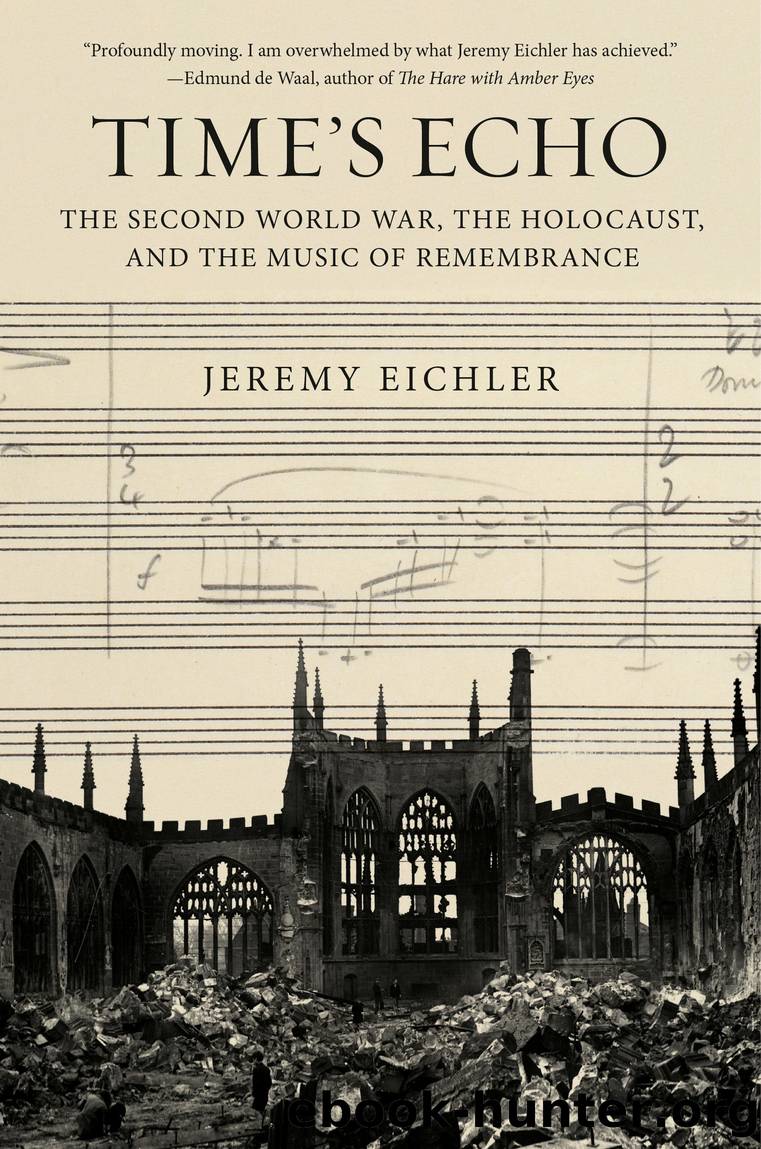Time's Echo by Jeremy Eichler;

Author:Jeremy Eichler; [Eichler, Jeremy]
Language: eng
Format: epub
Publisher: Penguin Random House LLC
Published: 2023-08-29T00:00:00+00:00
In the War Requiem, Britten was able to deploy Owenâs verse like small detonations placed perfectly at key fulcrum points in the requiem text, thereby creating a work that simultaneously honors the dead in solemn tradition-minded tones and refuses to naturalize their deaths, to airbrush the brutality of war, or falsely separate institutional religion from the patriarchal power structures that made war possible in the first place. As a result, the War Requiem never lets the listener escape into a facile ârest in peaceâ sense of consolation. Britten seems to believe, as with Schoenbergâs Survivor from Warsaw, that to say peaceful farewell to the dead is to forget them. Or conversely, as Nietzsche wrote, âonly something which never stops hurting remains in memory.â
The work itself is immensely scaled, lasting ninety minutes and requiring a vast composite ensemble. The traditional Mass setting is mostly sung by a mixed chorus, its forces amplified at key moments by a solo soprano, and accompanied by a full orchestra. The interlaid settings of Owenâs poetry are in turn sung by tenor and baritone soloists, accompanied by a separate chamber orchestra. Finally, there is a boysâ choir, typically positioned offstage, which sings portions of the Latin Mass set in an older style, at once archaic and celestial, as if representing a more ancient and uncorrupted relationship to faith. Britten once described the boysâ choir as âthe impersonal voices of innocence.â
The work begins with a somber, outwardly calm yet inwardly tense setting of the traditional âRequiem aeternamâ prayer, the plea for eternal rest. Brittenâs forces and his writing style here stand on the shoulders of the great requiem tradition, but the composer, once dubbed a ârevolutionary conservative,â has filtered this tradition through a modern scrim. The bells that toll from deep within the orchestra form a dissonant tritone, an effect that is picked up in the chorus and instantly destabilizes the atmosphere. Irregular meters catch the ear off guard. The string lines have a lurching quality. Britten layers in the archaic-celestial voices of the boys, whose initial entrance has meter changes in every bar, and the chorus quietly intones the prayer, âEternal rest grant unto them, O Lord.â But scant rest follows as some six minutes into the movement, the tempo suddenly quickens, textures thin out, intensity builds, and the tenor bursts in with words that shatter the musicâs already taut surfaces: âWhat passing-bells for these who die as cattle?â The line, from Owenâs âAnthem for Doomed Youth,â brilliantly positions the soloist as if he were a fellow listener alongside the audience, now rising up to bitterly interrogate the music we have just heard. Those bells of piety, faith, and tradition, the sonnet suggests, only mock the gruesome slaying of men sent to their pointless deaths on the battlefield:
Only the monstrous anger of the guns.
Only the stuttering riflesâ rapid rattle
Can patter out their hasty orisons
No mockeries for them from prayers or bells,
Nor any voice of mourning save the choirs,â
The shrill, demented choirs of wailing shells;
And bugles calling for them from sad shires.
Download
This site does not store any files on its server. We only index and link to content provided by other sites. Please contact the content providers to delete copyright contents if any and email us, we'll remove relevant links or contents immediately.
Periodization Training for Sports by Tudor Bompa(7332)
The MacArthur Bible Commentary by John MacArthur(4239)
The Body: A Guide for Occupants by Bill Bryson(3803)
The Sports Rules Book by Human Kinetics(3590)
What It Really Takes to Get Into Ivy League and Other Highly Selective Colleges by Hughes Chuck(3221)
Marijuana Grower's Handbook by Ed Rosenthal(3120)
The Sprouting Book by Ann Wigmore(3054)
Salt, Fat, Acid, Heat: Mastering the Elements of Good Cooking by Nosrat Samin(2658)
The Martian by Andy Weir(2611)
Classic by Mary Berry(2504)
The Bread Bible by Rose Levy Beranbaum(2475)
Sapiens and Homo Deus by Yuval Noah Harari(2416)
The Marketing Plan Handbook: Develop Big-Picture Marketing Plans for Pennies on the Dollar by Robert W. Bly(2416)
Harry Potter 4 - Harry Potter and The Goblet of Fire by J.K.Rowling(2416)
Martha Stewart's Baking Handbook by Martha Stewart(2333)
50 Economics Classics by Tom Butler-Bowdon(2067)
Screenplay: The Foundations of Screenwriting by Syd Field(2058)
The Cambridge Grammar Of The English Language by Rodney Huddleston Geoffrey K. Pullum(2049)
The Plant Paradox by Dr. Steven R. Gundry M.D(2040)
